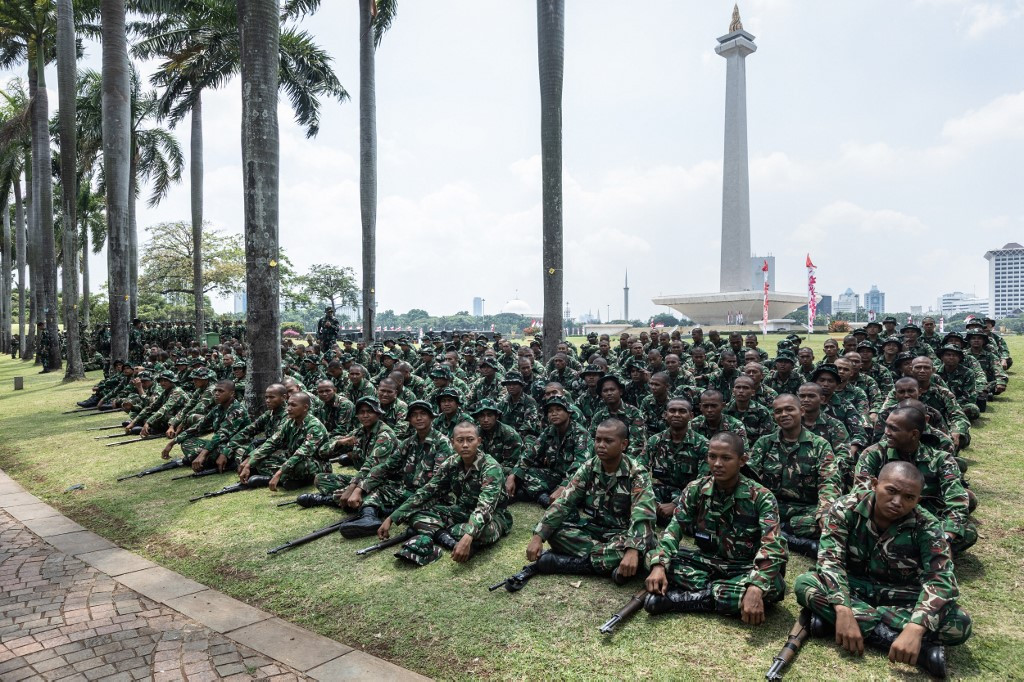Popular Reads
Top Results
Can't find what you're looking for?
View all search resultsPopular Reads
Top Results
Can't find what you're looking for?
View all search resultsRising militarism
In the wake of looting and rioting in late August, President Prabowo Subianto deployed more than 75,000 Indonesian Military (TNI) soldiers to secure areas in and around Jakarta.
Change text size
Gift Premium Articles
to Anyone
Political developments in the past few weeks have not been very kind to the concept of civilian supremacy in the country.
In the wake of looting and rioting that took place in late August, President Prabowo Subianto agreed to the deployment of more than 75,000 soldiers from the Indonesian Military (TNI) to secure areas within and around Jakarta.
It could have been a bigger display of military might, as security authorities proposed the deployment of more than 100,000 troops in the city.
The troops’ deployment may have been the largest in the capital city since 1998, when soldiers in armored vehicles patrolled the streets following civil unrest that ended with the resignation of then-president Soeharto.
Also in response to the unrest in August, President Prabowo sacked coordinating minister for political and security affairs Budi Gunawan after serving only 10 months in office, convinced that the former police general had failed to coordinate a proper response to handle the protests and street violence.
To replace Budi, on Wednesday President Prabowo inaugurated Djamari Chaniago, his senior at the military academy who in the late 1990s served as commander of the Army Strategic Reserves Command (Kostrad).
The appointment of Djamari is only the latest in a series of decisions allowing both active and retired military generals to take charge of civilian institutions.
In May this year, then-finance minister Sri Mulyani Indrawati appointed Djaka Budhi Utama, a retired lieutenant general who was once found guilty of kidnapping human rights activists, as head of the Customs and Excise Directorate General.
Later in July, another Army officer Maj. Gen. Ahmad Rizal Ramdhani was appointed as president director of the State Logistics Agency (Bulog), in charge of one of the most crucial agencies involved in food security.
Other than packing civilian institutions with military generals, President Prabowo has also designed policies that allow military officers to have leading positions in their execution.
In the food security program, the plan is to have thousands of soldiers deployed in the country’s remote regions to work on lands that will produce rice and other staple foods.
Currently, TNI soldiers are taking leading roles in a forestry task force that is expected to seize lands illegally occupied or used by palm oil companies.
Plans are also afoot to expand the military presence outside of Java, including the deployment of the Army’s Special Forces (Kopassus) to far-flung regions.
This certainly looks like an aberration in a civilian-led democracy like Indonesia. But the reality today is that this expansion of the military’s role in politics could find its legal justification in the revised TNI Law, which was passed without much fanfare in March this year.
The revised law increases the number of state institutions to which military officers can be appointed without having to retire early from the service from 10 to 14. The new legislation also expands the TNI’s non-combat operations and extends sitting officers’ retirement age.
When the Constitutional Court (MK) read its ruling on Wednesday to uphold the legality of the revised TNI Law, the court’s judges were up against insurmountable odds.
It was difficult for them to turn the tide in a political atmosphere that was already welcoming the increased presence of the military in civilian affairs. And with soldiers still patrolling the streets as the court was hearing the case, it was as if the panel of judges was staring down the barrel.
But it is unfair to pin our hopes on the court to save this nation from rising militarism.
The job of ensuring civilian supremacy should be in the hands of politicians both in the executive and legislative branches of the government, it is they who should devise rules mandating that the primary role of the military is national defense.











